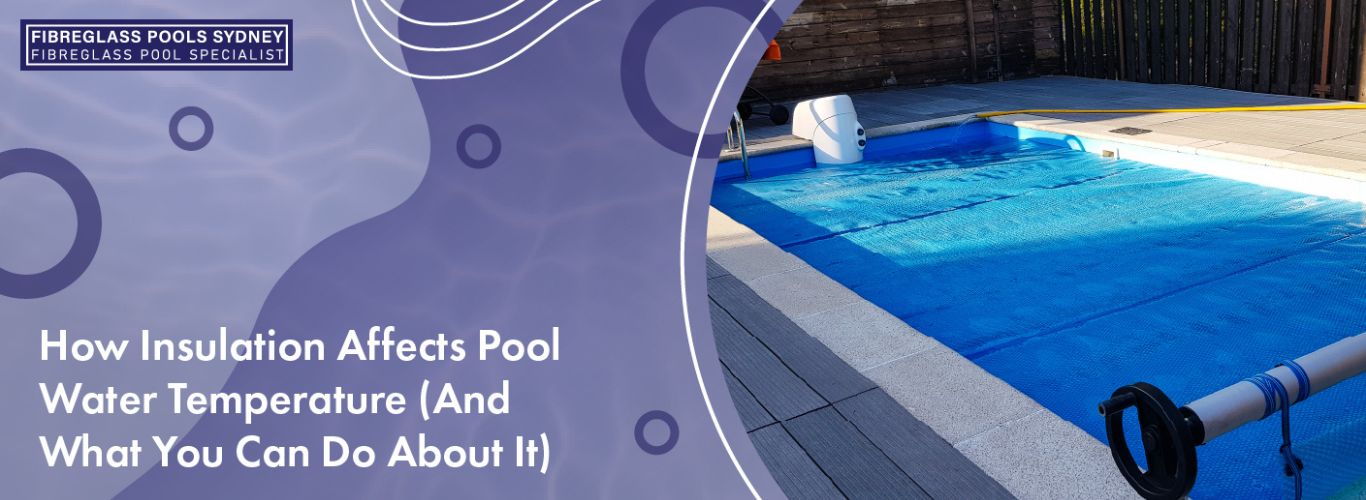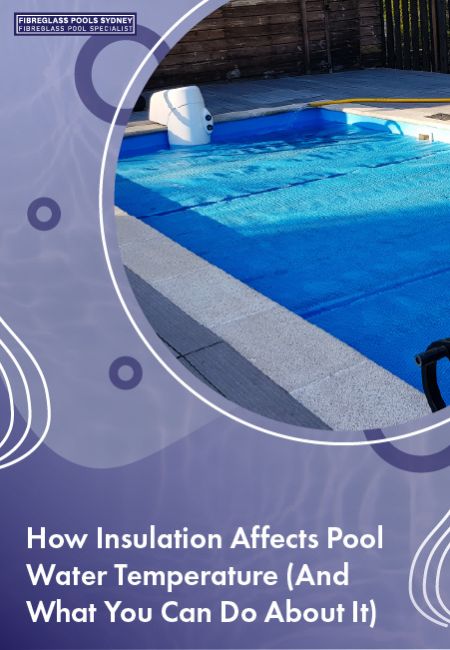How Insulation Affects Pool Water Temperature (And What You Can Do About It)
Pool temperature is one of the biggest factors influencing how often you’ll use your swimming pool—and how much you’ll enjoy it when you do. While things like sunlight, weather patterns, and heating systems play an obvious role, insulation is the often-overlooked element that significantly affects how warm your pool stays. If you’ve noticed your water temperature dropping overnight, or your heating bills creeping higher than expected, insulation (or a lack of it) could be to blame. The good news? There are smart ways to address the issue—especially when you’re choosing a new fibreglass pool or upgrading an existing one. Let’s look at how insulation affects pool water temperature, what you can do to improve it, and why fibreglass pools offer a serious advantage.


Why Pool Temperature Matters
Nobody enjoys stepping into icy water on a cool morning, and few households want to spend hundreds of dollars each month just to keep the water at a swimmable temperature. Comfortable pool temperature is not only a matter of convenience—it affects your usage, enjoyment, and long-term costs.
The ideal swimming temperature is generally between 26°C and 28°C. If your pool loses too much heat overnight, you’ll either need to reheat it (which costs energy and money) or accept that it won’t be usable as often as you’d like.
What Causes Pools to Lose Heat?
Before we get into insulation specifically, it helps to understand how pools lose heat in the first place. The main causes include:
- Evaporation: The number one reason pools cool down. As water evaporates, it takes heat energy with it.
- Conduction: Heat escapes into the ground and surrounding environment through the pool shell.
- Radiation: Warm water releases infrared heat into the cooler air above.
- Convection: Wind moving across the pool’s surface pulls heat away.
While pool covers can reduce evaporation and wind effects, insulation plays a key role in stopping heat from escaping through the structure of the pool itself.
Insulation in Different Pool Types
1. Concrete Pools
Concrete is dense and durable, but it’s also a poor insulator. It conducts heat easily, meaning a large amount of warmth escapes from the water into the surrounding soil. Without additional insulation layers (which are expensive and not standard in most builds), concrete pools tend to lose heat faster.
2. Vinyl Liner Pools
Vinyl liner pools generally have a steel or polymer wall with a vinyl layer on top. While slightly better than concrete at retaining heat, they’re still relatively inefficient without added insulation.
3. Fibreglass Pools
This is where fibreglass pools shine. Fibreglass is naturally insulating. The material’s low thermal conductivity helps retain water temperature longer—especially when combined with foam-filled shells or insulation-laminated designs offered by premium manufacturers. That means warmer water, less heating required, and lower energy bills.


Factors That Influence Pool Insulation
Insulation doesn’t just come down to what your pool is made of. Several factors influence how well your pool retains heat:
Shell Material
As mentioned, fibreglass provides superior insulation compared to concrete or vinyl.
Pool Position
Pools that are fully in-ground lose more heat to the surrounding soil than those built partially or fully above-ground. However, fibreglass pools are often easier to install in versatile positions, allowing for better planning.
External Insulation
Some pools can be retrofitted with external insulating foam or panels around the shell to reduce heat loss. This is more common in colder climates or where pools are heated year-round.
Pool Cover Usage
Even the best-insulated pool will lose heat quickly if left uncovered. A high-quality thermal pool cover significantly reduces evaporation and prevents heat loss overnight or on cool days.
How to Improve Your Pool’s Heat Retention
If you’re building a new pool or trying to get more out of your existing one, here’s what you can do to optimise insulation:
Choose a Fibreglass Pool
Fibreglass pools naturally insulate better, holding heat in longer and reducing your need for artificial heating. They also heat up more quickly from sunlight during the day.
Use a Thermal Pool Cover
Invest in a properly fitted solar or thermal pool cover. These can reduce heat loss by up to 70% and minimise evaporation as well.
Add a Pool Blanket Roller
If you’re using a pool cover daily, a roller system makes it easier to manage—ensuring you actually use the cover instead of avoiding the hassle.
Improve Landscaping and Wind Protection
Wind accelerates heat loss through convection. Strategic landscaping like fences, hedges, or privacy screens can create a buffer and help the water retain heat more effectively.
Consider Pool Heating as a Supplement
Insulation helps hold heat, but if you want year-round swimming or precise control, a pool heating system (like a heat pump or solar panels) can top things off. The more insulated your pool, the less work your heating system has to do.


Why Fibreglass Pools Make a Smart Long-Term Investment
Choosing a fibreglass pool isn’t just about looks or installation time. It’s about performance, too. The built-in insulation properties of fibreglass mean:
- Your pool stays warmer, longer
- Heating costs are reduced
- The water reaches ideal temperatures more quickly
- You’ll likely use your pool more often—even in the shoulder seasons
Combined with quick installation, low maintenance needs, and a long-lasting finish, fibreglass pools are a standout option for Australian families wanting comfort and efficiency in one package.
Ready for a Warmer, More Comfortable Pool?
If you’re thinking about installing a new pool—or want to make sure your next one holds heat better and costs less to maintain—fibreglass is the way to go.
At Fibreglass Pools Sydney, we specialise in designing and installing premium fibreglass pools that look amazing, feel great, and help you get the most out of every swim. With naturally insulating materials and modern designs, we help Sydney homeowners create backyard spaces they can enjoy for more of the year.
Get in touch today to chat with our friendly team and find the perfect fibreglass pool for your home.


